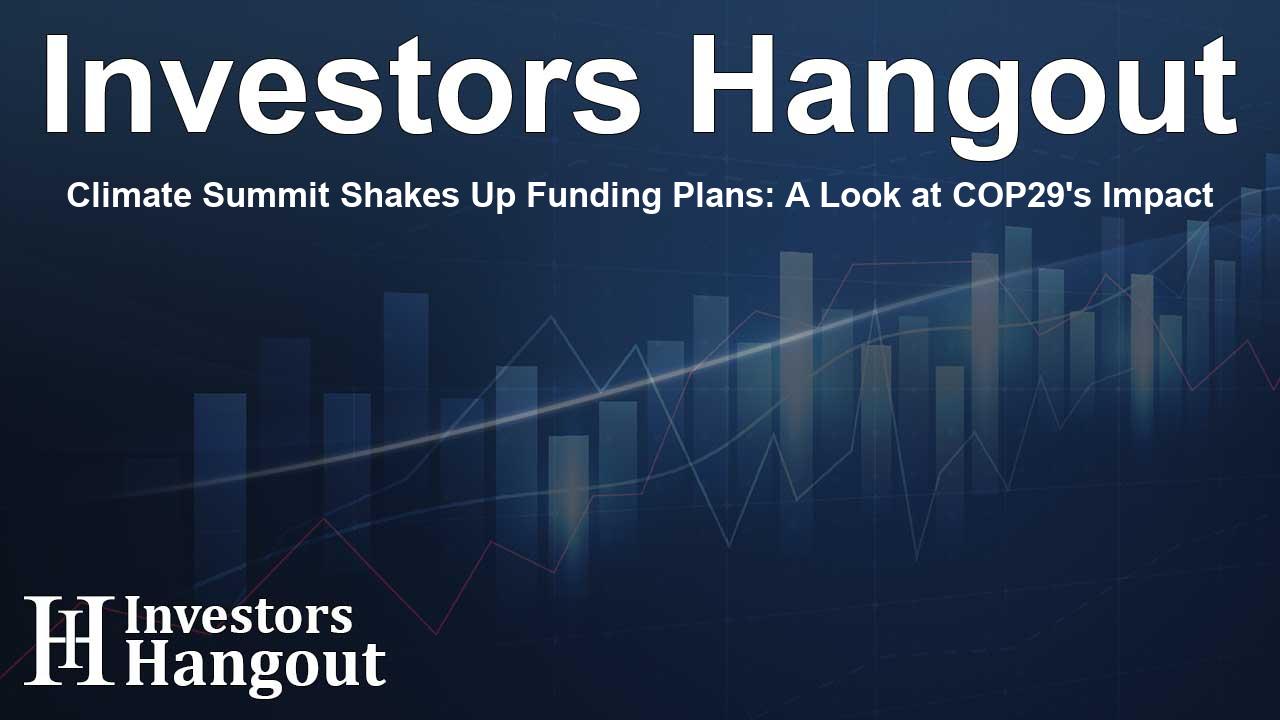Climate Summit Shakes Up Funding Plans: A Look at COP29's Impact

COP29: The Climate Summit's Findings on Global Funding
The COP29 climate summit concluded in Azerbaijan with a significant agreement to provide $300 billion each year to developing nations by 2035. This commitment aims to address the impacts of climate change on vulnerable nations.
Funding Commitments and Global Reactions
This new agreement marks a noteworthy advancement from the prior commitment of $100 billion, yet it still falls short of the estimated $1.3 trillion needed to combat the pressing climate crisis effectively.
The reaction to this deal has been mixed, as many nations viewed it as insufficient. For instance, India labeled the funds a "paltry sum," and Nigeria openly dismissed it as a "joke," highlighting the widespread sentiment that more substantial financial support is necessary to tackle emerging climate challenges.
Concerns About Climate Finance
Experts also weighed in on the matter. Ani Dasgupta, the CEO of the World Resources Institute, emphasized the need for greater financial contributions to adequately prepare vulnerable countries for escalating climate threats.
Environmental organizations have voiced their disappointment as well. The World Wildlife Fund (WWF) underscored how the agreement does not meet the ambition required to mitigate climate impacts, with the Global Climate and Energy Lead, Manuel Pulgar-Vidal, stating, "The world has been let down by this weak climate finance deal."
The Importance of Meeting Climate Goals
Current projections suggest that the world is on track for a temperature rise of 3.1°C by the end of the century, far exceeding the Paris Agreement's target of limiting warming to 1.5°C. This underscores the urgency for immediate and further actions in not only funding but also implementing robust climate strategies.
Commitments from Developed Nations
The 1992 UN Framework Convention on Climate Change outlines that 23 developed nations in addition to the European Union are obligated to contribute to climate finance efforts. This funding will focus on essential adaptation strategies, including the development of sustainable infrastructure and enabling a shift towards renewable energy within developing regions.
The Future of Global Carbon Markets
Furthermore, COP29 established guidelines for a global carbon market designed to allow companies to offset their emissions through purchasing credits tied to reforestation and renewable energy projects. These regulations aim to streamline the implementation of Nationally Determined Contributions (NDCs), with nations asked to revise their climate policies before February 2025.
Looking Ahead: What’s Next?
President Joe Biden heralded the agreement as a crucial move towards gathering the necessary funds to combat climate issues, fully aware of the work yet to come. However, the uncertainty surrounding the future U.S. contribution remains, especially with the potential return of former President Donald Trump, who previously withdrew from the Paris Agreement.
The next major climate discussion is set for COP30, scheduled to take place in November 2025 in Belém, Brazil, which is already being touted as a pivotal meeting. Brazilian representatives promise that this summit will significantly address global warming goals.
Market Reactions to Climate Developments
In light of these developments, the iShares Global Clean Energy ETF (NASDAQ: ICLN) experienced a positive response post-summit, with shares rising by 1.83% to $12.34. This response indicates investor optimism in the market amid ongoing climate discussions.
Frequently Asked Questions
What is the main outcome of the COP29 summit?
The COP29 summit resulted in an agreement to provide $300 billion in climate funding to developing nations by 2035.
Why was the $300 billion funding considered insufficient?
Many countries and experts assert that the required funding to adequately address climate change challenges is closer to $1.3 trillion annually.
What challenges do developing nations face regarding climate change?
Developing nations often lack the necessary resources to implement climate resilience strategies, making substantial funding critical for their adaptation efforts.
What are the expected next steps for the global climate agenda?
Nations are urged to update their Nationally Determined Contributions (NDCs) by February 2025, while discussions will continue into the COP30 summit in 2025.
How did the market respond to COP29 outcomes?
The iShares Global Clean Energy ETF saw a rise in share prices following the summit, indicating positive market sentiment regarding climate financing.
About Investors Hangout
Investors Hangout is a leading online stock forum for financial discussion and learning, offering a wide range of free tools and resources. It draws in traders of all levels, who exchange market knowledge, investigate trading tactics, and keep an eye on industry developments in real time. Featuring financial articles, stock message boards, quotes, charts, company profiles, and live news updates. Through cooperative learning and a wealth of informational resources, it helps users from novices creating their first portfolios to experts honing their techniques. Join Investors Hangout today: https://investorshangout.com/
Disclaimer: The content of this article is solely for general informational purposes only; it does not represent legal, financial, or investment advice. Investors Hangout does not offer financial advice; the author is not a licensed financial advisor. Consult a qualified advisor before making any financial or investment decisions based on this article. The author's interpretation of publicly available data shapes the opinions presented here; as a result, they should not be taken as advice to purchase, sell, or hold any securities mentioned or any other investments. The author does not guarantee the accuracy, completeness, or timeliness of any material, providing it "as is." Information and market conditions may change; past performance is not indicative of future outcomes. If any of the material offered here is inaccurate, please contact us for corrections.